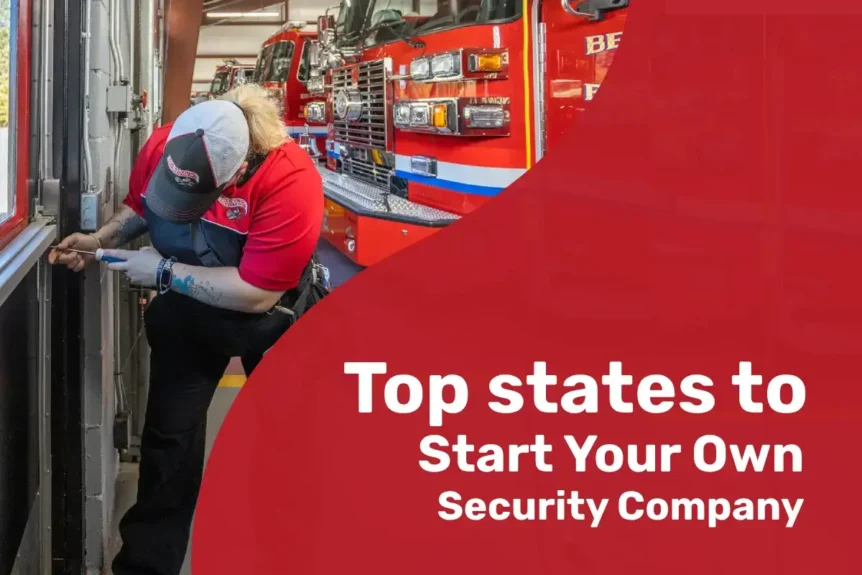Table of Contents
This article provides a comprehensive guide for investors interested in starting a security company. It focuses on the opportunities and particularities of doing so in major U.S. cities, solving common doubts about creating a security business, from market research to licensing and services.
Why Start a Security Company?
The demand for security services is ever-growing, driven by increased concerns over safety, crime, and the need for specialized protection. Starting a security company can be a profitable and impactful investment, offering services to residential, commercial, and industrial clients. The business potential spans a variety of services, including surveillance and cybersecurity, making it a versatile and resilient industry.
How to Start Your Own Security Business: Step-by-Step
- Conduct Market Research
Understand your target market’s needs by identifying industries and neighborhoods that require security services. Research competitors, assess pricing models, and evaluate gaps in the market. - Create a Detailed Business Plan
Develop a comprehensive plan that outlines your goals, budget, target audience, marketing strategy, and projected financials. Highlight the services you plan to offer and the resources required.Learn how to create a business plan
More Info - Choose the Right Location
Select a city or region with a high demand for security services. Consider population density, crime rates, and local economic activity when deciding where to establish your business. - Secure Licenses and Permits
States and municipalities may have specific licensing requirements for security companies. Research local regulations, ensure compliance, and obtain any necessary certifications for your staff and business. - Decide on Services Offered
Determine which services your company will specialize in. This may include locksmith services, electrified hardware, CCTV cameras, alarm systems, or cybersecurity solutions. - Build Relationships with Suppliers
Partner with reliable suppliers to source vehicles, surveillance equipment, and other necessary tools. Ensure your equipment meets industry standards. - Recruit and Train Staff
Hire qualified personnel and provide comprehensive training in safety protocols, conflict resolution, and client interaction. Certifications like locksmith licensing may be required. - Develop a Marketing Strategy
Create a strong brand presence through a professional website, social media platforms, and local advertising. Network with businesses and organizations to generate referrals and partnerships. - Purchase Insurance
Invest in liability insurance to protect your business from potential lawsuits or claims. Coverage for employees, vehicles, and equipment is also essential. - Launch Your Business
Host a launch event or promote your security business’s opening through local media and community channels. Focus on delivering excellent service to build a positive reputation.
Services and Sub-Services Offered by a Security Company
A successful security business can offer a wide range of services, tailored to meet diverse client needs. Below are the core services and their sub-services:
- Commercial and Residential Solutions
- Installation and maintenance of advanced locking mechanisms.
- Keyless entry, card readers, and biometric security
- Surveillance and Monitoring
- CCTV installation and monitoring
- Alarm systems and sensors
- Remote video monitoring
- Cybersecurity Solutions
- Data protection
- Threat detection and mitigation
- Network security audits
- Consulting Services
- Risk assessment
- Security audits
- Emergency response planning
- Specialized Services
- Loss prevention
- Fire watch
- Construction site security
- School and campus security
Explore the World of Security Franchise Opportunities
More InfoTop 6 U.S. States in Which to Start a Security Company
- California
- Top Cities: Los Angeles, San Francisco, San Diego
- Why it’s a great fit:
- Population density and high crime rates in urban areas.
- Significant demand from tech companies and entertainment businesses for cybersecurity and physical security.
- Thriving economy with diverse industries requiring protection.
- Florida
- Top Cities: Miami, Orlando, Tampa
- Why it’s a great fit:
- Rapidly growing population and tourism industry.
- High demand for commercial and residential protection.
- Opportunities in securing coastal properties and ports.
- Texas
- Top Cities: Houston, Dallas, Austin
- Why it’s a great fit:
- Large corporate hubs and industrial facilities.
- Increasing need for cybersecurity in tech-driven cities.
- High potential for residential and gated community security.
- Wisconsin
- Top Cities: Milwaukee, Madison, Green Bay
- Why it’s a great fit:
- Growing healthcare and educational sectors.
- Stable economy and low competition in smaller cities.
- Demand for both physical and cybersecurity services.
- Washington
- Top Cities: Seattle, Spokane, Tacoma
- Why it’s a great fit:
- Strong presence of tech companies requiring advanced security.
- High property crime rates in urban centers.
- Opportunities in protecting ports and maritime industries.
- Michigan
- Top Cities: Detroit, Grand Rapids, Ann Arbor
- Why it’s a great fit:
- Revitalization efforts in urban areas like Detroit.
- Need for industrial security due to automotive and manufacturing hubs.
- Increasing interest in residential and community security.
Final Thoughts
Starting a security company in the U.S. offers lucrative opportunities for investors, particularly in high-demand areas such as California, Texas, and Washington state. By understanding local market needs, securing the proper licenses, and offering a diverse range of services, you can establish a profitable and sustainable security business.
Want to learn more about the best security company franchise? Contact the franchise team at FlyLock Security Solutions today!
Contact us to explore the Flylock Franchise Program in the US
More Info

